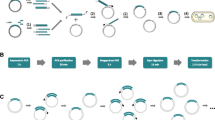Abstract
PTO-QuickStep is a quick and easy molecular cloning technique that allows seamless point integration of a DNA fragment, encoding either a tag or a protein, into any position within a target plasmid. The entire process is conducted in a time-efficient and cost-effective manner, without the need of DNA gel purification and enzymatic restriction and ligation. PTO-QuickStep further innovates protein engineering by providing the possibility of integrating a random mutagenesis step (e.g., error-prone PCR) into the workflow, without compromising the time duration required. Random mutagenesis libraries can be quickly and efficiently cloned into a plasmid of interest, thereby accelerating directed evolution. On top of that, PTO-QuickStep can be utilized for rapid integration of noncoding DNA fragments to modify existing plasmids, making it an excellent tool for synthetic biologists.
Access this chapter
Tax calculation will be finalised at checkout
Purchases are for personal use only
Similar content being viewed by others
References
Tee KL, Wong TS (2013) Polishing the craft of genetic diversity creation in directed evolution. Biotechnol Adv 31:1707–1721
van den Ent F, Lowe J (2006) RF cloning: a restriction-free method for inserting target genes into plasmids. J Biochem Biophys Methods 67:67–74
Miyazaki K (2011) MEGAWHOP cloning: a method of creating random mutagenesis libraries via megaprimer PCR of whole plasmids. Methods Enzymol 498:399–406
Jajesniak P, Wong TS (2015) QuickStep-cloning: a sequence-independent, ligation-free method for rapid construction of recombinant plasmids. J Biol Eng 9:15
Jajesniak P, Tee KL, Wong TS (2019) PTO-QuickStep: a fast and efficient method for cloning random mutagenesis libraries. Int J Mol Sci 20:3908
Putney SD, Benkovic SJ, Schimmel PR (1981) A DNA fragment with an alpha-phosphorothioate nucleotide at one end is asymmetrically blocked from digestion by exonuclease III and can be replicated in vivo. Proc Natl Acad Sci U S A 78:7350–7354
Wan WB, Seth PP (2016) The medicinal chemistry of therapeutic oligonucleotides. J Med Chem 59:9645–9667
Wong TS, Tee KL, Hauer B, Schwaneberg U (2004) Sequence saturation mutagenesis (SeSaM): a novel method for directed evolution. Nucleic Acids Res 32:e26
Wong TS, Roccatano D, Loakes D, Tee KL, Schenk A, Hauer B, Schwaneberg U (2008) Transversion-enriched sequence saturation mutagenesis (SeSaM-Tv+): a random mutagenesis method with consecutive nucleotide exchanges that complements the bias of error-prone PCR. Biotechnol J 3:74–82
Wong TS, Tee KL, Hauer B, Schwaneberg U (2005) Sequence saturation mutagenesis with tunable mutation frequencies. Anal Biochem 341:187–189
Dennig A, Marienhagen J, Ruff AJ, Schwaneberg U (2014) OmniChange: simultaneous site saturation of up to five codons. Methods Mol Biol 1179:139–149
Blanusa M, Schenk A, Sadeghi H, Marienhagen J, Schwaneberg U (2010) Phosphorothioate-based ligase-independent gene cloning (PLICing): an enzyme-free and sequence-independent cloning method. Anal Biochem 406:141–146
Hanahan D (1983) Studies on transformation of Escherichia coli with plasmids. J Mol Biol 166:557–580
Acknowledgments
We thank the Department of Chemical and Biological Engineering, ChELSI, EPSRC (EP/E036252/1), BBSRC (BB/R020183/1), RAEng|The Leverhulme Trust Senior Research Fellowship (LTSRF1819\15\21; to TSW), the University of Sheffield GCRF Fellowship (to KLT), and the University of Sheffield PhD scholarship (to PJ) for financial support.
Author information
Authors and Affiliations
Corresponding author
Editor information
Editors and Affiliations
Rights and permissions
Copyright information
© 2022 Springer Science+Business Media, LLC, part of Springer Nature
About this protocol
Cite this protocol
Jajesniak, P., Tee, K.L., Wong, T.S. (2022). Rapid Cloning of Random Mutagenesis Libraries Using PTO-QuickStep. In: Currin, A., Swainston, N. (eds) Directed Evolution. Methods in Molecular Biology, vol 2461. Humana, New York, NY. https://doi.org/10.1007/978-1-0716-2152-3_8
Download citation
DOI: https://doi.org/10.1007/978-1-0716-2152-3_8
Published:
Publisher Name: Humana, New York, NY
Print ISBN: 978-1-0716-2151-6
Online ISBN: 978-1-0716-2152-3
eBook Packages: Springer Protocols



